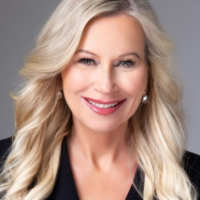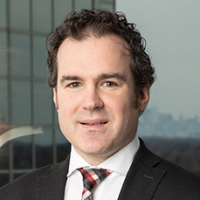Toronto Bankruptcy & Debt Lawyers, Ontario
Not enough matches for Toronto Bankruptcy & Debt lawyer.
Below are all Toronto lawyers.
Sponsored Lawyers
1-10 of 16 matches
Employment, Labor Law
John-Edward C. Hyde is a Partner and Chair of the Management-side Labour Group, at Hyde HR Law. John is one of only 22 lawyers in Canada, certified as a Specialist in Labour Law by the Law Society of Upper Canada. John advises management on all aspects of employment and labour law, including representation before administrative tribunals, collective agreement negotiation, arbitrations, wrongful dismissal defense and human rights. He also assists clients in providing strategic legal and human resources advice on labour and employment matters arising out of complex mergers, acquisitions and the sale of businesses. John’s pre-law background is in operations and human resources management in the transportation industry. This experience provides him with the unique opportunity to assist clients in the formulation of practical legal solutions, specifically tailored to their needs. John represents private, public and institutional clients in a wide variety of labour and employment matters across Canada. His clients include international transportation interests, construction companies, manufacturers, health care providers, universities and major breweries. John has developed widely recognized legal sub-practices in the specialized areas of Transportation and Construction Labour Relations. He is the author of a number of articles in various labour and employment publications, and frequently appears in the press, to comment on critical issues in HR law.
(more)Divorce & Family Law, Family Law, Divorce, Juvenile Law
Providing a unique combination of family or criminal law legal services and life coaching using a holistic approach. Helping clients as a lawyer, supportive life coach, or both. Family Law Services: -Divorce -Separation -Custody/Access Coaching Services: -Life Coaching -Divorce & Relationship Coaching -Women's Coaching -Customized Programs -Group Programs & Workshops
(more)Accident & Injury, Insurance, Car Accident, Slip & Fall Accident, Products Liability
My clients appreciate the personal service they receive from my firm. I believe it is important to keep in touch with clients and to keep them regularly informed of developments in the case. It is my policy to return phone calls and e-mails promptly. In representing disability/personal injury claimants, I act on a contingency basis. That means you will pay no upfront fees. My fee payment comes as a percentage of whatever financial compensation I obtain in your claim. In the unlikely event that I do not obtain a financial settlement or award, you owe me nothing but out-of -pocket expenses.
(more)Criminal, DUI-DWI, Traffic, Felony, Misdemeanor
Our winning team of experienced Ontario criminal lawyers provides hope and real solutions to those charged with DUI, DWI, impaired driving or other criminal offences. We offer a free 30-minute consultation, affordable payment plans and we do not charge interest or for travel costs/mileage. ----------------------------------------------------------------------- After being called to the Ontario Bar in 1984, Richard Aitken began to focus his practice on criminal defence matters. Over the years, this focus shifted more and more to include cases involving DUI – the area of law that now forms the bulk of the Aitken Robertson practice. Mr. Aitken has been assisting clients with their DUI charges for over 30 years now. Mr. Aitken has extensive training on Standardized Field Sobriety Testing, Drug Recognition Evaluation and DUI trial tactics. He has completed a wide variety of DUI defence courses, such as his most recent ones including “Mastering Scientific Evidence in DUI/DWI Cases” in March of 2015, “Scientific Evidence in Impaired Driving Cases” in 2014, “A Recipe for Success – Trial Techniques that Win” in 2013, as well as several courses regarding further DUI tactics and training on both the Intoxilyzer 5000C and 8000C breath testing instruments in Atlanta, Georgia in 2014. Mr. Aitken’s practice extends to several different Ontario, Canada cities, including full-time operations in Peterborough, Oshawa, and Kingston, and satellite offices in Toronto, North York, Scarborough, Markham, and Ajax. Having these locations available to meet with new, prospective and current clients allows Aitken Robertson to offer proficient representation to accused persons all throughout central, eastern and southern Ontario, Canada. Lastly, Mr. Aitken is proud of a number of noteworthy cases. One example is on a summary conviction appeal, prepared by colleague Edwin Boeve, Mr. Aitken made arguments at the level of the Superior Court on a case that dramatically changed the law regarding when an accused person must be given rights to counsel.
(more)Business, Business Organization, Contract, Corporate, Real Estate
I am looking forward to seeing how I can help you. Don’t hesitate to call!
(more)Accident & Injury, Wrongful Death, Slip & Fall Accident, Personal Injury, Insurance
Peter is a Partner with Smitiuch Injury Law and has exclusively worked as an injury and wrongful death lawyer his entire career. He has extensive knowledge and experience in acting as a fearless advocate to obtain compensation and accident benefits for injured individuals and families. Peter has acted as counsel on a number of trials and arbitration hearings at the Ontario Superior Court of Justice and the Financial Services Commission of Ontario. Most notably, Peter was co-counsel in Stilwell v. Corning Inc., the first successful trial verdict against Corning in North America involving Visions cookware. The trial verdict was upheld by the Ontario Court of Appeal. In December 2014, as co-counsel with Mike and Megan, Peter helped to obtain a jury verdict against Glen Eagle Golf Club for over $1.8 million in damages and interest. In March 2015, Peter was lead counsel with co-counsel, Luke, in a judge alone trial arising from serious personal injuries sustained by a minor Plaintiff while boarding an amusement park ride with his father at Centreville Amusement Park (Bhatt v William Beasley Enterprises Limited). At trial, Peter successfully obtained a Judgment in favour of the minor Plaintiff and his parents against William Beasley Enterprises Limited. Recently, Peter was acknowledged by the Ontario Trial Lawyers Association for his work as a trial lawyer and was presented with the 2016 Martin Wunder, Q.C. Outstanding New Lawyer Award. Peter continues to pursue his goal of becoming a leading advocate in the field of personal injury law with an emphasis in the areas of occupiers’ liability, product liability, police brutality, wrongful death, motor vehicle accident claims and statutory accident benefits.
(more)Accident & Injury, Wrongful Death, Slip & Fall Accident, Car Accident, Personal Injury
Ms. Megan Johnston is an Associate Lawyer at Smitiuch Injury Law. After articling with the firm, she was Called to the Bar on June 20, 2014. She will be working directly for the firm's Principal, Michael Smitiuch, on personal injury matters.
(more)Accident & Injury, Personal Injury, Car Accident, Wrongful Death, Insurance
Luke Hamer is an Associate Lawyer at Smitiuch Injury Law and exclusively practices in the area of personal injury and wrongful death. Luke has acted as counsel on a number of jury and judge alone trials at the Ontario Superior Court of Justice, before the Divisional Court and at arbitrations at the Financial Services Commission of Ontario. In March 2015, Luke acted as co-counsel with Peter Cho in a judge alone trial arising from serious personal injuries sustained by a minor Plaintiff while he was boarding an amusement park ride with his father at Centreville Amusement Park (Bhatt v William Beasley Enterprises Limited). At trial with Peter, Luke helped successfully obtain judgment in favour of the minor Plaintiff and his parents against William Beasley Enterprises Limited. Luke obtained his Juris Doctor degree from Bond University in Robina Gold Coast, Australia. He also holds an Honours Bachelor of Science degree in Anthropology and English from the University of Toronto. Luke has volunteered with Habitat for Humanity and as a camp counselor in Guelph, Ontario.
(more)Accident & Injury, Car Accident, Personal Injury, Wrongful Death, Insurance
Shawn Snider is an Associate Lawyer at Smitiuch Injury Law. After articling with the firm, he was Called to the Bar on June 25, 2019. He will be working directly for the firm's Principal, Michael Smitiuch, on personal injury matters. After completing his undergraduate degree and prior to enrolling in law school, Shawn played professional hockey for nine years in the U.S., Sweden and Germany. At law school, Shawn participated in the Osgoode Mediation Intensive Clinic that provided mediation services to the York campus and surrounding communities. During this time, he was also the Head Coach of the 2002 Mississauga Reps AAA Hockey team, from which, thirteen players were drafted in the 2018 Ontario Hockey League (OHL) draft. In his spare time, Shawn spends time with family and friends, plays golf and travels as much as possible.
(more)Family Law
A natural entrepreneur, Lisa took a few detours after law school before settling in family law, where she has happily been in private practice for the last 25 years plus. Nothing if not a well-rounded person, Lisa owned an ice cream store and owned a travel company that once led a singles trip to Nepal for a major Internet dating site. While an undergraduate, she and Gelman & Associates’ COO Karen Kotansky even owned a company that employed other students to sell paper products in bulk door to door. In fact, her talent and drive to grow successful businesses was recognized by PROFIT and Canadian Business in 2016 where she was included in the W100 list of Canada’s Top Female Entrepreneurs. Lisa has been firmly dedicated to her family law practice since 1995, and in 2001, she began the law firm of Gelman & Associates. Her stats are impressive. She has a B.A. from the University of Western in political science and an LLB from Osgoode Hall Law School. She was called to the Ontario Bar in 1995.
(more)













